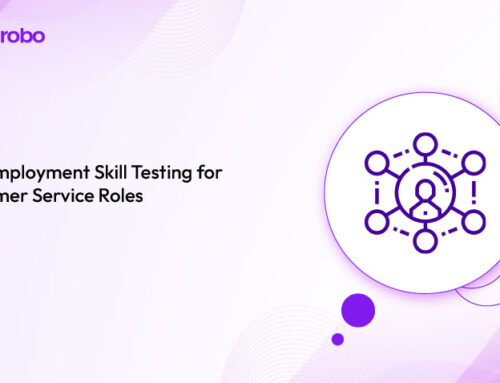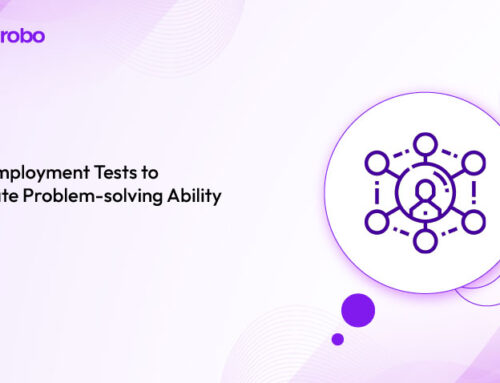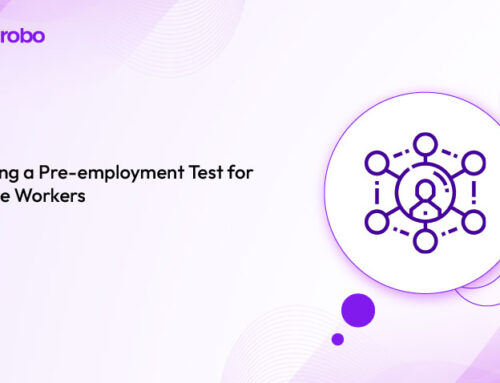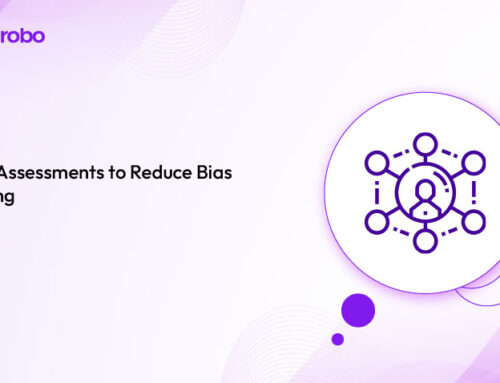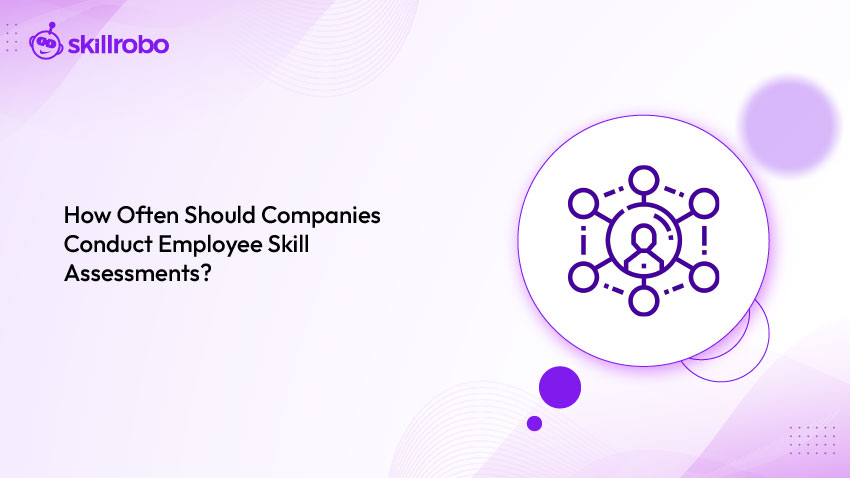
Key Takeaways
- Regular skill assessments align employee capabilities with evolving organizational goals, enhancing adaptability.
- Frequent assessments, balanced with purpose, support development without overwhelming employees or HR teams.
- Companies assessing skills annually or biannually report higher performance and engagement.
- Real-time analytics on Skillrobo enable timely evaluations, identifying skill gaps efficiently.
Finding the Right Rhythm for Skill Assessments
Employee skill assessments are a cornerstone of workplace growth, but pinning down how often to do them can feel like solving a puzzle. Too frequent, and they burden HR and staff, turning a good idea into a chore; too rare, and skills stagnate, leaving teams unready for change. A balanced approach shows employees their development matters, keeping them sharp and aligned with company goals. It’s about finding a rhythm that drives progress without stress.
This blog explores how often to assess skills, what shapes that choice, and practical ways to make the process work for everyone.
Why Skill Assessment Frequency Matters
The timing of skill assessments can make or break a company’s ability to stay agile and competitive. Regular evaluations ensure employees’ abilities match current tasks and future plans, building a workforce that adapts quickly. Overdo it, though, and you exhaust your team, making assessments feel pointless; underdo it, and you miss chances to grow talent, creating gaps that slow you down.
A 2024 Harvard Business Review article highlighted that 61% of firms with consistent skill reviews adapt more swiftly to industry changes, gaining a strategic edge.
However, finding the right frequency requires balancing purpose with feasibility—overdoing assessments can strain resources and frustrate staff while neglecting them risks skill stagnation and missed potential. A thoughtful schedule keeps skills fresh, lifts morale, and saves resources, letting HR nurture a team ready for any challenge.
Keeping Skills Relevant
Industries shift fast—new tech, market trends, or customer demands can outdated skills overnight. Assessments pinpoint gaps, like a need for cloud computing or better communication, ensuring employees stay equipped. Take a retail team adopting new inventory software: regular checks confirm they’re fluent, avoiding costly errors. This isn’t just about keeping up; it’s about empowering your team to innovate and lead, giving the company an edge in a crowded market.
Boosting Employee Engagement
When employees know their growth is valued, they’re more invested. Assessments with clear feedback signal a commitment to their future, fostering loyalty. A 2023 Indeed survey showed that 58% of workers prioritize skill-building opportunities, tying them to higher morale. Imagine a junior analyst getting tips to sharpen their data skills—it’s not just feedback; it’s a path to grow, making them feel seen. Pair this with fair practices, with the help of eliminating bias in skill evaluations, to ensure everyone gets an equal shot to shine.
Avoiding Resource Overload
Too many assessments can overwhelm HR and frustrate employees, turning insight into noise. A focused schedule—say, tied to a product launch—delivers results without clogging calendars. Picture HR drowning in review data while staff gripe about “another quiz.” By keeping assessments purposeful, you gain clarity on skills without disrupting work. Device broader strategies to streamline recruitment processes with tips to balance efficiency and impact, ensuring resources stay lean.
Factors Influencing Assessment Frequency
There’s no one-size-fits-all for skill checks—it depends on your company’s pulse. HR must weigh what drives the business and its people to land on a cadence that fuels growth without derailing daily tasks. The right frequency strengthens development, keeps employees engaged, and syncs with bigger goals, all while respecting everyone’s time and effort.
Industry Pace and Change
Fast-evolving fields like tech or marketing demand frequent reviews to match rapid shifts—new coding languages or ad platforms emerge constantly. Slower sectors, like manufacturing, can stretch longer. A software company might assess developers biannually to ensure they master tools like Python’s latest frameworks, keeping projects cutting-edge. Timing assessments to your industry’s rhythm ensures skills don’t lag behind competitors.
Employee Role and Level
Roles shape needs. Entry-level staff, like call center agents, might thrive with quarterly feedback to build confidence in tough conversations. Senior leaders, like CFOs, often need yearly reviews to refine strategic skills. Tailoring assessments avoids wasting time—nobody wants a director stuck in basic tests or a rookie lost without guidance. It’s about matching the process to each person’s work.
Organizational Goals
Big moves—like adopting AI tools or expanding globally—require skilled teams to succeed. Assessments before these shifts spot gaps early. For instance, a retailer launching online sales might check digital literacy first, ensuring staff can navigate e-commerce platforms. Aligning evaluations with goals makes them strategic, not routine, driving wins where they matter most.
Employee Lifecycle Stage
Career stages dictate timing. New hires need early checks to set a baseline—say, a marketer learning SEO tools. Veterans might need occasional refreshers, like an engineer updating cybersecurity skills. Adjusting to these phases keeps assessments helpful, not overbearing.
For more on lifecycle support, our blog on nurturing talent through assessments explores ways to guide employees at every step.
Recommended Cadences for Skill Assessments
Choosing when to assess skills means balancing company needs with employee well-being. The best schedules feel intentional, offering insights without exhausting anyone. Whether it’s a yearly review or a quick check post-project, assessments should empower growth, not create hurdles. Here are practical options to fit your context.
Annual Assessments
Yearly reviews suit stable industries like logistics or education, where skills evolve slowly. They give a clear snapshot of team abilities, aligning with long-term plans. A warehouse might assess forklift operators annually to confirm safety standards, keeping evaluations deep but doable. This cadence works without overwhelming HR or staff, maintaining focus on core work.
Biannual Assessments
Twice-yearly checks fit fast-moving fields like tech or advertising, where skills shift rapidly. A 2023 Forbes insight found that 53% of these companies use this to stay innovative. Picture a digital marketing team refreshing their analytics skills every six months—they stay agile and ready for new campaigns. It’s a rhythm that keeps teams ahead without feeling rushed.
Event-Driven Assessments
Assessments after milestones—like promotions or major projects—ensure readiness for new roles. When a sales rep becomes a manager, a skill check confirms they can lead. This targeted approach ties evaluations to real changes, feeling relevant, not random. It’s a smart way to support transitions while keeping schedules light.
Ongoing Micro-Assessments
Short, regular check-ins—like a quick quiz on new software—track growth without stress. They’re great for agile teams, letting employees improve steadily. A design firm might test new editing tools monthly, keeping HR’s workload low and skills current. For more on scalable testing, our post on cloud-based aptitude testing dives into flexible solutions.
Benefits of Skill Assessments
Consistent assessments don’t just spot gaps—they build strengths that lift teams. They give HR clear paths to guide training, boost performance, and create a workplace where people feel valued. Done thoughtfully, they’re a win for employees and the company, fueling growth that sticks.
Enhanced Skill Agility
Evaluations keep employees nimble, and ready for shifts like new tech or market demands. A finance team assessed on budgeting software adapts faster, keeping the company competitive. This flexibility ensures your workforce isn’t just reacting—they’re leading, prepared to tackle whatever challenges come next with confidence.
Targeted Development Plans
Identifying gaps—like weaker project management—lets HR design training that hits the mark. Instead of broad courses, employees get tailored support, like a coder mastering APIs. This saves time and drives results, ensuring training fuels job performance and company goals efficiently.
Improved Performance Tracking
Regular reviews show how skills evolve and impact work, giving HR a clear progress map. Tracking a manager’s leadership over time reveals their growth. This data sets goals, measures success, and keeps teams aligned, making every assessment a step toward bigger wins.
Increased Employee Confidence
Feedback from assessments highlights strengths and next steps, building self-assurance. A support rep learning they excel at problem-solving feels valued, sparking drive. When growth feels personal, employees engage more, fostering a workplace where people thrive and stay. Our guide on building employee confidence through feedback offers more ways to inspire.
How to Optimize Assessment Timing
Skillrobo makes timing assessments easier with flexible, AI-driven tools. It delivers role-specific tests and analytics, helping HR schedule evaluations that matter without complexity. This ensures assessments are impactful, supporting growth while keeping processes smooth and stress-free for everyone involved.
The tool simplifies scheduling assessments with flexible, AI-driven tools, offering role-specific tests and analytics to make evaluations impactful without complexity. It helps HR time assessments to support employee growth while keeping processes smooth and stress-free. But optimization goes beyond tools—it’s about planning with purpose.
Below are five steps to ensure your assessments hit the mark, balancing company needs with employee well-being for maximum value.
Step 1: Align Assessments with Business Goals
Timing works best when assessments support what your company’s chasing—say, launching a new product or scaling operations. Before setting a schedule, map evaluations to key milestones. For example, if your firm’s adopting cloud software, test relevant skills like data migration beforehand. This keeps assessments strategic, not random, ensuring employees are ready for big moments.
Step 2: Customize Frequency by Role
Not every role needs the same cadence. Junior staff, like support agents, might benefit from quarterly checks to build confidence, while managers need yearly reviews to hone leadership. Analyze job demands—technical roles often require more frequent updates than administrative ones. Tailoring timing avoids wasted effort, making assessments feel relevant. Role-specific tests let you tweak evaluations to fit, ensuring precision without overloading anyone.
Step 3: Communicate Purpose Clearly
Employees resist assessments if they seem like busywork. Explain why they matter—maybe they unlock training or promotions—so people see the value. Before a review, share how results will guide growth, like improving customer handling skills. Transparency builds trust, turning skepticism into buy-in.
Step 4: Use Data to Refine Timing
Analytics can reveal when assessments work best. Look at past evaluations—did biannual checks catch gaps faster than yearly ones? Real-time insights show trends, like which skills lag in certain teams, helping you adjust schedules. For instance, a sales team might need mid-year reviews to stay sharp on negotiation. Data-driven tweaks ensure timing stays effective, avoiding guesswork and keeping evaluations tied to real needs.
Step 5: Balance Frequency to Avoid Burnout
Too many assessments exhaust everyone, diluting their impact. Cap frequency based on capacity—say, annual reviews for stable roles, biannual for dynamic ones. Monitor feedback: if employees feel overwhelmed, scale back. A tech firm might limit coders to two deep evaluations yearly, using quick check-ins otherwise. This balance keeps assessments meaningful, letting HR focus on growth without bogging down teams or workflows.
Overcoming Common Challenges
Crafting a solid assessment schedule can hit snags—budgets, doubts, or outdated tests. Tackling these thoughtfully creates a process that’s fair, practical, and valued by all. Here’s how to navigate hurdles and keep assessments on track without derailing your team.
Avoiding Over-Assessment
Too many reviews can make employees feel watched, not helped, draining focus. A lean schedule targeting key skills—like collaboration—keeps assessments useful. A retail team might assess cashiers yearly, catching gaps without overload, so the process feels constructive, not heavy-handed, for both HR and staff.
Managing Costs
Frequent checks might seem costly, but smart tools stretch budgets. Skillrobo is a scalable platform that fits teams big or small, from ten analysts to a thousand factory workers, keeping assessments affordable. This lets you gain insights without financial strain, balancing cost and impact effectively.
Ensuring Relevance
Outdated tests—like quizzing old software—lose value fast. Regularly updating assessments to match new goals or tools ensures they deliver. A logistics firm might refresh tests for new tracking systems, giving HR data that drives decisions. Staying current keeps assessments credible and actionable.
Gaining Employee Buy-In
If assessments feel like busy work, people push back. Explaining their value—say, unlocking career growth—and keeping them fair builds trust. Transparent processes, like sharing how feedback shapes training, turn skeptics into partners. Learn more about fostering fairness in assessments offers practical steps.
How Skillrobo Optimizes Assessment Timing
AI-powered Skillrobo revolutionizes skill assessments by offering HR professionals unmatched flexibility and precision in determining the ideal frequency. Its advanced features adapt to organizational needs, ensuring evaluations are both timely and impactful without adding complexity.
Our platform streamlines assessment timing by leveraging AI to analyze workforce trends and role-specific needs, ensuring evaluations align with business cycles. Real-time analytics identify optimal moments for skill checks, like pre-project phases, while customizable schedules prevent employee fatigue. This data-driven approach maximizes impact, helping HR deliver targeted development plans that keep skills sharp and teams ready without disrupting workflows or overloading resources.
Conclusion
Determining the ideal frequency for skill assessments is crucial to sustaining a capable, engaged workforce that meets organizational demands. Skillrobo simplifies this with role-specific assessments, cognitive and behavioral evaluations, real-time analytics, and secure proctoring, empowering HR to time evaluations with precision and effectiveness. Whether annual, biannual, or event-driven, it ensures skills remain sharp and relevant without overburdening teams, driving growth and adaptability.
Ready to optimize your assessment schedule? Sign up for Skillrobo today and leverage data-driven insights to keep your employees’ skills aligned and competitive.



